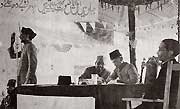
Introductory passage is provided by this website and may not represent the views of the archived document's author. BACK 
Search the Republic of Rumi |
|
|
Lahore Resolution The following resolution embodies the All-India
Muslim League's demand for the partition of India. It was passed
Note: In many popular versions the third paragraph stands alone as the "Pakistan Resolution." Lahore Resolution 1. While approving and endorsing the action taken by the Council and the Working Committee of the All-India Muslim League, as indicated in their resolutions dated the 27th of August, 17th and 18th of September and 22nd of October, 1939, and 3rd of February 1940, on the constitutional issue, this session of the All-India Muslim League emphatically reiterates that the scheme of Federation embodied in the Government of India Act, 1935 is totally unsuited to, and unworkable in the peculiar conditions of this country and is altogether unacceptable to Muslim India. 2. It further records its emphatic view that while the declaration dated the 18th of October, 1939, made by the Viceroy on behalf of His Majesty's Government is reassuring in so far as it declares that the policy and plan on which the Government of India Act, 1935 is based will be reconsidered in consultation with the various parties, interests and communities in India, Muslim India will not be satisfied unless the whole constitutional plan is reconsidered de novo and that no revised plan would be acceptable to the Muslims unless it is framed with their approval and consent. 3. Resolved that it is the considered view of this session of the All-India Muslim League that no constitutional plan would be workable in this country or acceptable to Muslims unless it is designed on the following basic principle, namely, that geographically contiguous units are demarcated into regions which should be so constituted, with such territorial readjustments as may be necessary, that the areas in which the Muslims are numerically in a majority, as in the North-Western and Eastern Zones of India, should be grouped to constitute 'Independent States' in which the constituent units shall be autonomous and sovereign. That adequate, effective and mandatory safeguards should be specifically provided in the constitution for minorities in these units and in these regions for the protection of their religious, cultural, economic, political, administrative and other rights and interests in consultation with them; and in other parts of India where Mussalmans are in a minority, adequate, effective and mandatory safeguard shall be specially provided in the constitution for them and other minorities for the protection of their religious, cultural, economic, political, administrative and other rights and interests in consultation with them. This session further authorises the Working Committee to frame a scheme of constitution in accordance with these basic principles, providing for the assumption finally by the respective regions of all powers such as defence, external affairs, communications, customs and such other matters as may be necessary. Source: Struggle for Independence (1958). Pakistan Publications, Karachi Back to Top

Search the Republic of Rumi
|
| Page Hits | Visitors | BACK | HOME | CONTACT |
